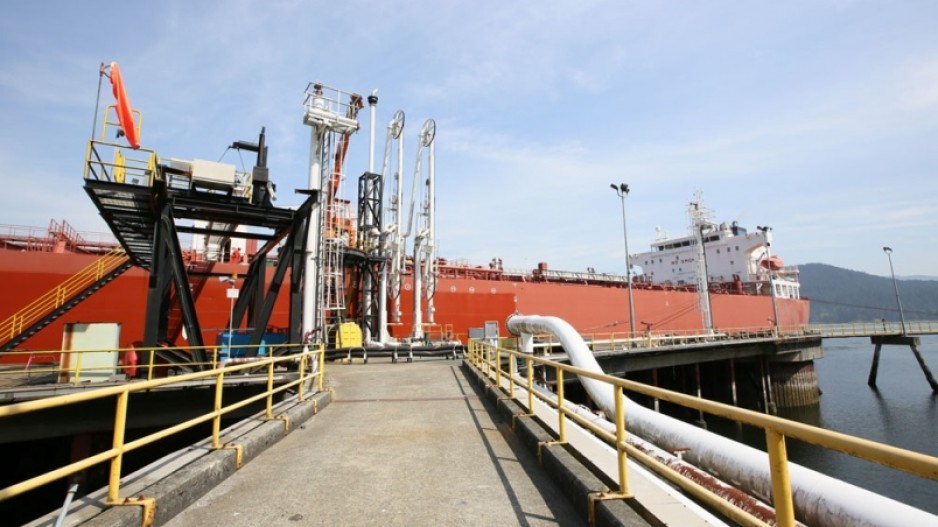A new study led by a Simon Fraser University professor concludes that the Trans Mountain expansion will cost Canada $12 billion and be of no net benefit to Canada.
“The study tested different scenarios and found that the net loss to Canada could range from a low of $3.2 billion to a high of $18.5 billion,” a press release included with the study states. “The study found no likely scenario in which the project would generate a net benefit to Canada.”
The analysis was done by Thomas Gunton, SFU professor of Resource and Environmental Planning Program, Chris Joseph (Swift Creek Consulting), and Daniel Dale (SFU, School of Resource & Environmental Management.)
“The $11.9 billion loss to Canada is primarily due to a more than doubling of the Trans Mountain construction costs from the original $5.4 billion to $12.6 billion, combined with new climate policies just confirmed by the Supreme Court that will reduce the demand for oil,” Gunton says in a press release.
But given that the pipeline is being expanded mainly for exports to other countries, like the U.S. and China, it’s not clear how Canada’s carbon tax would reduce the demand for oil in other countries.
Rory Johnston, managing director and market economist for Price Street, said Canadian carbon pricing may have an impact in terms of squelching production in Canada, but would have little impact on global oil prices or demand. One of the rationales for the Trans Mountain expansion was to give Alberta producers greater access to other markets.
Of the roughly 4.5 million bpd of oil produced in Canada, about 3 million bpd day is exported -- mostly to the U.S.
The Trudeau government ended up buying the Trans Mountain pipeline and assuming the responsibility for expanding it after Kinder Morgan (TSX:KMI) walked away from the project in frustration.
The Trudeau government paid $4.4 billion for the existing pipeline and terminal in Burnaby and for the $1 billion already spent on thje expansion project.
The total cost of the expansion is estimated at $12.6 billion. The government’s plan is to try to sell the pipeline to private interests, after the pipeline twinning project is completed.
The project has long-term commitments by shippers for 80% of the new pipeline’s capacity. The study questions the ability to fill the remaining 20% left over for spot markets.
“Securing spot shipments for the 20% of TMEP capacity not under long-term contracts will be impaired by excess pipeline capacity,” the study says.
It cites Enbridge’s plan to convert 90% of its existing capacity to long-term contracts for its Mainline network as one risk to the TMX in terms of spot market. The study’s authors estimate that will remove 2.2 million barrels per day from potential spot shipments.
“Further, given the weakening of oil markets, Enbridge’s shift to long-term contracts, and rising TMEP shipping costs, there is an increasing risk that shippers will not renew their long-term contracts on TMEP after they expire, thus increasing the risk of declining volumes and revenue.”
“The project completion BCA (benefit cost analysis) results show that Canada would be better off terminating construction of TMEP. The principal reason for this is that the oil that will be transported on TMEP could be transported on other pipelines without incurring the remaining costs of constructing TMEP. Consequently, additional spending on TMEP will not generate any incremental benefits."
The study argues that the expansion will end up costing Canada because it will have a negative impact on other pipelines.
“One of the primary reasons that TMEP would result in a large net cost to Canada is because building TMEP would create excess pipeline capacity,” the study says. “The costs of this excess capacity will be borne by other pipeline operators whose revenues will be reduced by the reallocation of oil shipments from existing pipelines to TMEP to fulfill shipping contracts signed before the downturn in oil markets.”
Johnston said his biggest criticism of the analysis is that it assigns no value to optionality. It may be true that, once TMX and Line 3 are built, there may be surplus pipeline capacity at times. But having spare pipeline capacity gives shippers more options when something interupts the flow of oil on some other pipeline -- when one is shut down due to a leak, for example.
"They place a zero dollar base-case option value," Johnston said. "Just that fact alone, that they essentially modelled that there is zero value of the option, I think that in itself is rather suspect.
"Just the option of bypassing the U.S. midwest and even the U.S. Gulf Coast has some inherent option value to it," he added.
Gunton insists that his study did consider optionality benefits but concludes "they are not large enough to offset the other costs of Trans Mountain."
When the Keystone XL pipeline still seemed viable, Johnston said that Canada might indeed be headed for surplus pipeline capacity.
"I've been on the record before saying that I didn't think that Western Canada needed all three of the major pipelines," Johnston said. "I didn't think we needed all three, but I did think we needed two."
But now that American President Joe Biden has killed Keystone XL, the case for TMX is stronger, he said.
"That just increases even more the utility or the value proposition of Trans Mountain."




